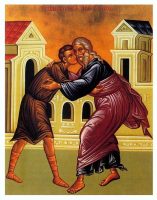Hello, I am Sr. Vassa, and I’m back having my coffee once again here in Vienna, in Austria, after a very long trip to the United States. I received a new Nespresso coffeemaker for Christmas while I was in the United States, from my older sister, Tatiana. So, I am making Nespresso coffee today.
While I was in the United States, I also received some nice gifts from a very wonderful parish in Washington DC, of St. John the Baptist: like this coffee mug that says Washington DC and these sunglasses. I am not sure when I will wear them, since I am a fashion icon now, and I can’t wear just anything, but we will see.
I also received at that same parish, from two viewers named Claire and Dorothy, this very nice mug with my own picture on it – if you can see that – and with Dorothy and Claire somewhere here as well. So I thank them for this nice mug and, in general, to all of the viewers, and friends, and relatives, who showed me such love and support while I was in the States – I just want to stop and thank you.
It is the month of February now and, in the Byzantine liturgical calendar, we have begun our preparation for Lent: that is, the long fasting period before the Feast of Easter. In church, we now sing prayers from this book called The Triodion, which contains all the services connected to the long fasting season called Lent. Oh, and I almost forgot to show you, I received yet another gift from that same parish in Washington DC, of St. John the Baptist: it is this heart-shaped little pad for my coffee mug, which, of course, reminds me of another day celebrated in February: Valentine’s Day.
So, we have lots of things to talk about today. But we will begin by discussing the first two Sundays of The Triodion: the Sunday of the Publican and Pharisee and the Sunday of the Prodigal Son. In the Byzantine tradition, we have four Sundays before the fasting period called Lent, which prepare us for the Fast.
These Sundays are of:
- The Publican and Pharisee
- The Prodigal Son
- The Last Judgement
- The Banishment of Adam from Paradise
Each of these Sundays gives us certain topics to contemplate from the Bible, topics that motivate us in different ways for the upcoming fasting period, so that we fast in the proper spirit. On the first Sunday of The Triodion, or four weeks before Lent, we hear the Gospel reading about the publican, or tax collector, and the Pharisee. This is a parable, or little story, told by Jesus Christ to illustrate a certain life-lesson. “Two men went up to the temple to pray: one a Pharisee and the other, a tax collector. The Pharisee, standing by himself, was praying thus: ‘God, I thank you that I am not like other people: thieves, rouges, adulterers, or even like this tax collector. I fast twice a week, I give a tenth of all my income.’ But the tax collector, standing far off, would not even look up to heaven, but was beating his breast and saying: ‘God, be merciful to me, a sinner!’ I tell you, this man went down to his home justified rather than the other; for all who exalt themselves will be humbled, but all who humble themselves will be exalted” (Lk.18: 10-14).
Now, note that the tax collector did indeed lead a corrupt life: he was a corrupt Jew, regarded as a religious outcast, in fact, by Orthodox Jews like the Pharisee in this story. Tax collectors are often classed in the Gospel with harlots, sinners, and even heathen. And the Pharisee in this story did indeed lead a life according to the external religious rules of his time. So, if these two men happened to be women today, you could compare them to, say, a pious Orthodox woman, who stands in church in a long skirt and head scarf, who properly fasts at all the proper times, and regularly goes to church, but despises other people; and another woman, who wanders into church once in a while in a short skirt, let us say, and perhaps, lots of makeup and no head scarf, and sleeps with various men out of wedlock; or perhaps, another kind of woman we tend to despise as religious Orthodox, somebody that is a religious outcast for us, say, an openly homosexual woman. And yet, in this story in the Gospel, the one who leaves justified by God is the corrupt guy, the religious outcast, the tax collector, because he regards himself with humility and relies only on God’s mercy.
Now, on the second Sunday of the pre-Lenten season, we hear another parable, or simple story, told by the Lord about the prodigal son. This is the story of a man with two sons. One day, the younger son asks his father for his share of the inheritance and takes all of it to a distant country, where he squanders all his money on things like, let’s say, parties, drugs, prostitutes, I don’t know… computer games, designer clothing, and the like. When he becomes totally destitute and hits rock bottom, so to say, he realizes that even the servants or hired hands in his father’s home had it better than he has it now on his own. So, he decides to return home and says to his father in all humility: “Father, I have sinned against heaven and before you. I am no longer worthy to be called your son; treat me like one of your hired hands” (Lk. 15:18-19). But the father takes him back with compassion, and even joy, not merely as a servant, but as his lost son, who is now found. Now, this story, of course, is about the young man’s change of mind, or repentance, but it also has to do with humility: the humility it took for the lost son to take an honest look at himself, to admit defeat, so to say, that he couldn’t make it on his own without God – Who is, of course, represented in this story by the Father.
So, let’s reflect a bit more on humility. In both of the Gospel stories we just talked about, we see that humility permits both the tax collector and the prodigal son to move out of themselves, out of their potential despair, or isolation, or fear toward God and toward others. Pride and self-reliance make us focused on our own selves, on our own gifts: be they outer virtues, as in the case of the Pharisee, or on material wealth, as is the case of the prodigal son, who wanted to make it on his own and thus isolated himself in a distant country, separated from his father, his brother, and his people. The Pharisee is also isolated, lacking true love and compassion for others: “I am not like the rest,” he says. He has lost his connection to others, having only demands for other human beings, rather than compassion.
Now on the topic of Valentine’s Day: let us instil humility into our approach to the one we love, because humility liberates us from self-centred demands and fears that can cripple any relationship before it even begins. I mean the fear of rejection or vulnerability and the fear of loss, which can turn us into control-freaks. In our relationships, let us humbly ask for God’s grace in prayer, as did the tax collector in his life, rather than depending on ourselves, because humility permits us to move out of ourselves and makes us capable of love.
That’s it for today, everyone. Happy Valentine’s Day, and see you next week! Thank you!


















